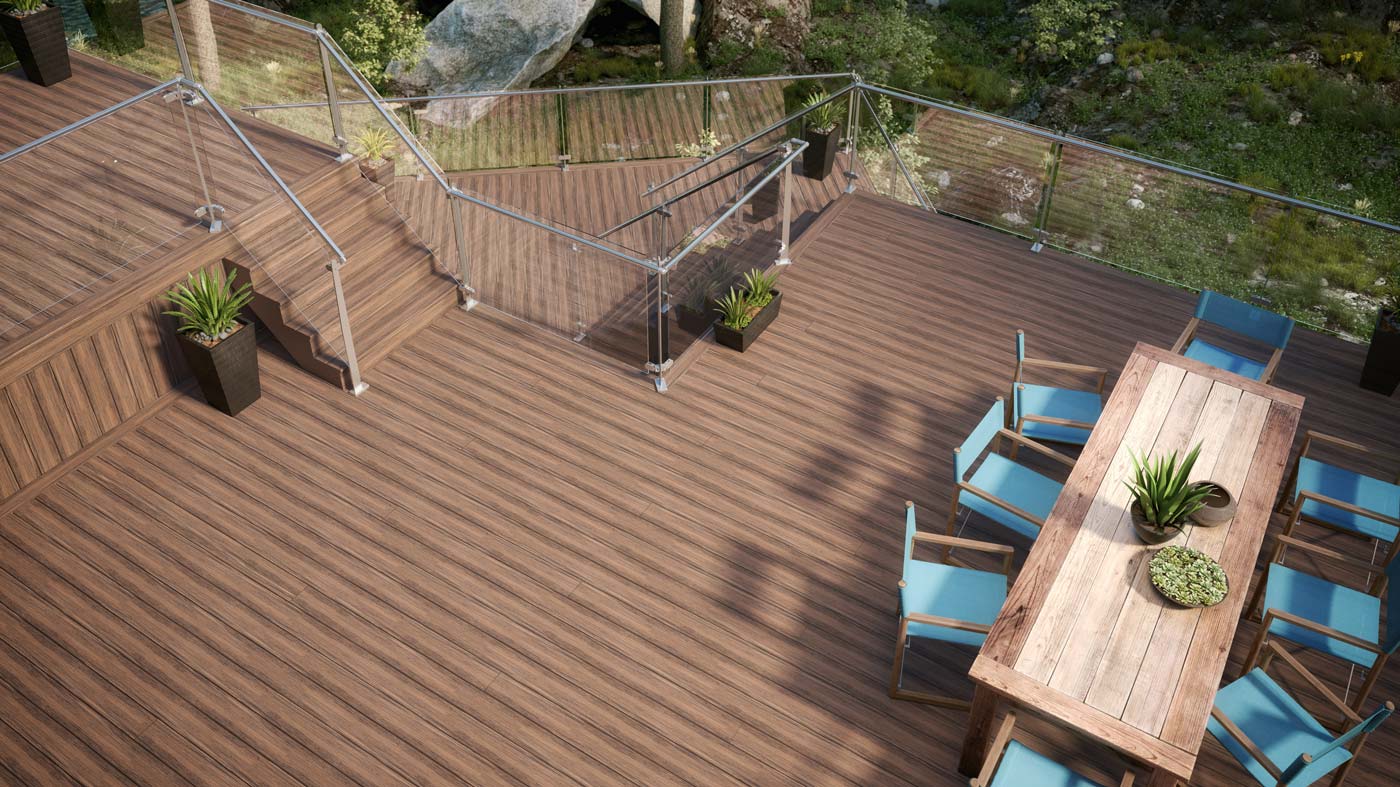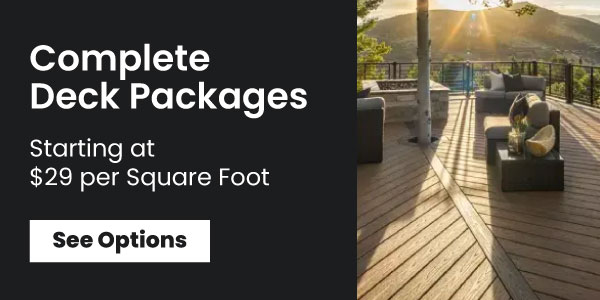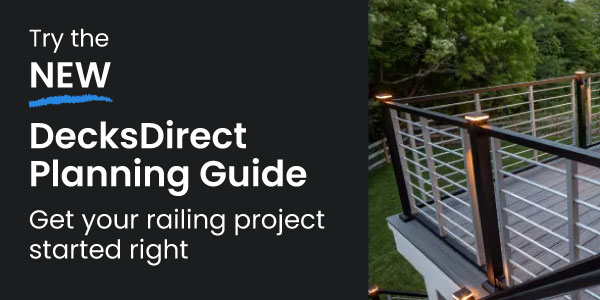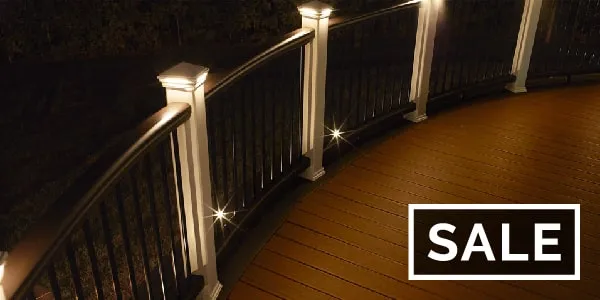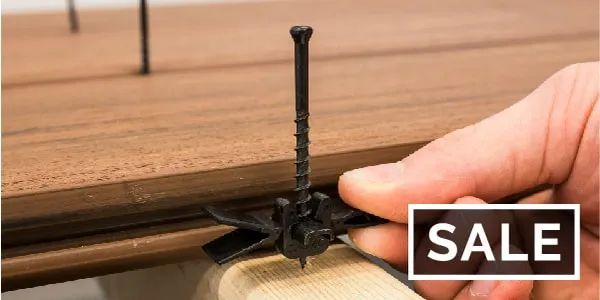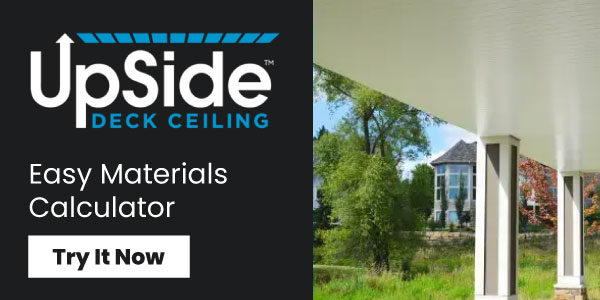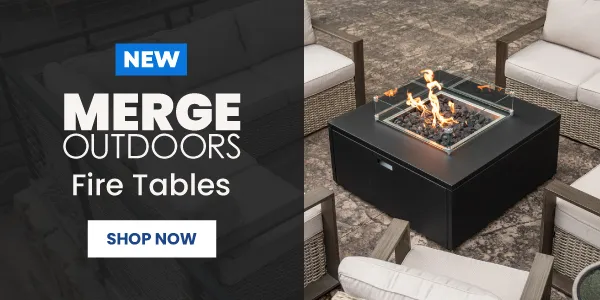How To Choose Your Decking Material
Once upon a time, nearly every deck was built from old-fashioned lumber. Choosing between decking materials meant choosing between several different species of wood.
It’s not ‘once upon a time’ anymore.
As deck owners are increasingly watching their dated wood decks fade, splinter, and crack, the decking industry has exploded with modern, low-maintenance deck material options to build better decks that hold their look and strength for decades. Read on to learn all about these high-quality deck material options and find which one best delivers on your deck vision. Or call us at 1-888-824-5316 to talk to an experienced deck project planner who can learn more about your deck goals and recommend the best deck boards for you!
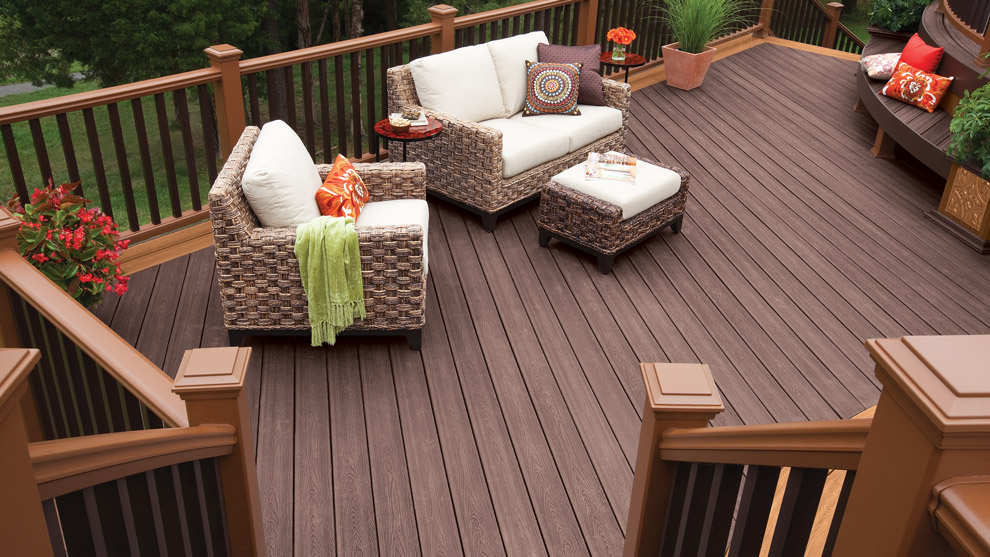
Table of Contents
- How To Find The Best Deck Board Material For Your Outdoor Living Space
- Best Decking Materials: PVC vs Composite Decking
- What Are The Different Types of Decking Materials?
- Traditional, High-Maintenance Decking
- What Is Composite Decking?
- What Is Mineral-Based Composite Decking?
- What Is PVC Decking?
- PVC Vs Composite Decking
- What’s the Best Decking Material For My Outdoor Living Space?
- Most Water-Resistant Deck Boards: PVC
- Deck Boards With The Most Style And Color Options: Composite
- Best-Performing Deck Boards In All Climates: Mineral-Based Composite
- Best Deck Boards For Staying Cool On Hot, Sunny Days: PVC
- Most Durable Deck Boards: PVC
- Safest Deck Boards For Foot Traction: Composite
- Most Natural-Looking Deck Boards: Composite
- Deck Boards With The Best Strength-To-Weight Ratio: Mineral-Based Composite
How To Find The Best Deck Board Material For Your Outdoor Living Space
PVC decking, composite decking, mineral-based composites: the surplus of options is spurring the creation of amazing decks all across the country - but it can also make it feel intimidating to start a deck renovation project or a new deck build.
The best way to choose your deck boards is to picture your ideal deck in exquisite detail - then work backward to find the decking material that best fits your vision.
That’s why DecksDirect is here: to make the deck planning process smooth, pain-free, and even fun. But more than that, we exist to make sure your deck project gets to “done” quickly and produces an awesome, high-quality deck you can enjoy for years to come without high maintenance costs and requirements.
Finding the best decking material depends heavily on your deck vision: what you will do on your deck, when you’ll enjoy it, and who you’ll enjoy it with. Our handy guide will help you envision your dream deck, then find the best material to deliver it. For an even more personalized deck project, give our planning team a call at 1-888-824-5316 to run through these questions and more with an experienced deck project planner!
Best Decking Materials: PVC vs Composite Decking
To start exploring which decking material is best for you, let’s start by getting a clear picture of what you want in a deck. Then we’ll run through the style and functional differences between different decking materials to help make your decisions clear.
Our deck project planners tailor every deck project to each customer’s unique needs. Here are a few of the questions we use to help plan a truly personalized deck project:
What Will You Do On Your Deck?
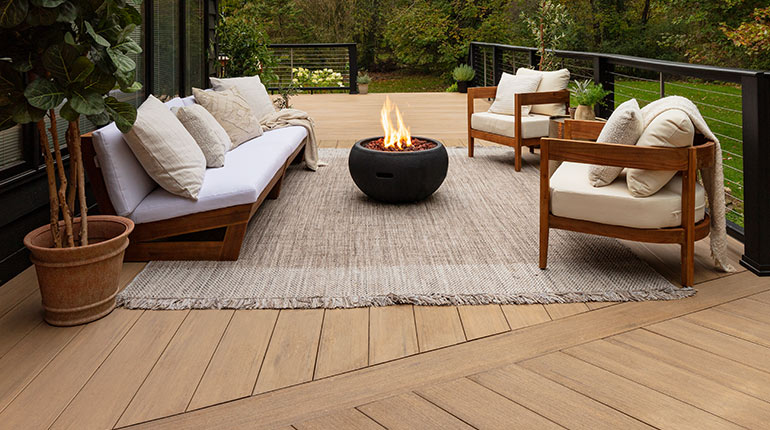
Some decks are relaxing getaways, an oasis to enjoy a hot cup of coffee with the peaceful sunrise, or a late-night glass of wine as the stress of the day evaporates. Other decks are lavish entertaining spaces to wow friends, family, and neighbors over a meal or a sizzling grill.
Do you have a specific activity you want to do on your deck? The photo above shows a cozy deck planned for relaxation, while the deck in the photo below is designed to create gardening space for a green-thumbed deck user. Knowing what you want to do on your deck helps you select a decking material that delivers on your deck goals.
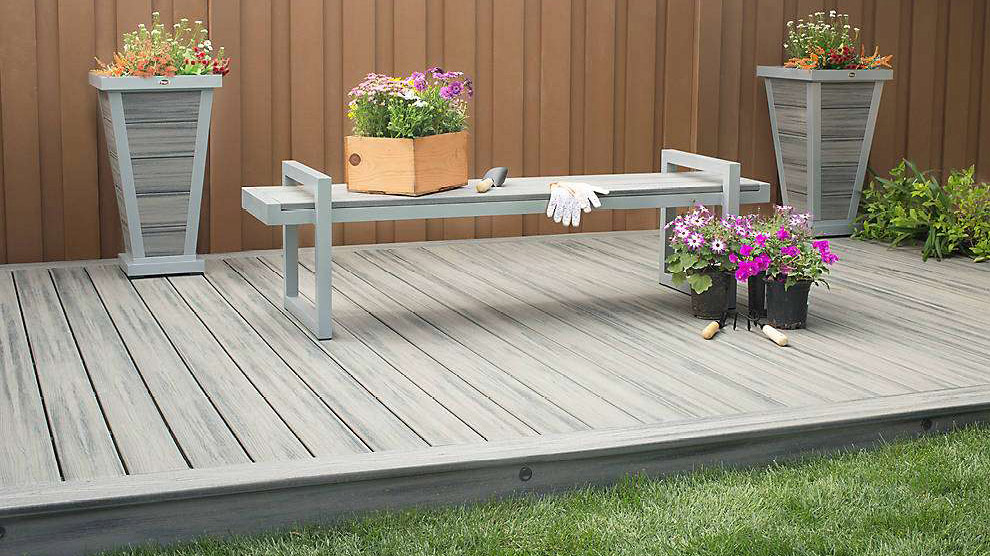
Where Is Your Deck?
Is your deck in a patch of warm sunlight most of the day? Or is it in a sheltered, tree-shaded yard? Is it near a pool, lake, or other body of water? Is it a south-facing deck or north-facing deck? What is your local climate like?
Different decking materials react differently to direct sunlight, changes in temperature, or regular exposure to water. Take your deck’s setting into account as we move on to each material’s natural qualities.
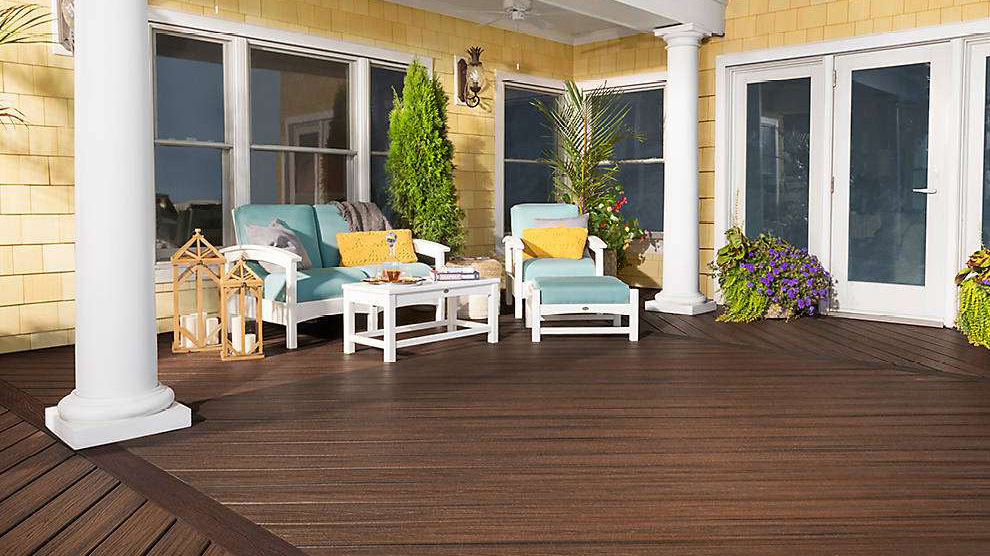
Who Will Use Your Deck?
Is your deck a quiet, peaceful escape for solitary relaxation? A cozy space for bonding with a few friends or a small family? Will you host large gatherings like grill-outs or outdoor dinners? Will you have children or elderly relatives enjoying your deck space with you?
Keep yourself and your deck guests at the front of your mind - you’ll want to choose decking materials that make your deck feel welcoming and comfortable to you and your guests while keeping everyone safe.
These are just a few of the questions to consider to help you select the best deck boards for you. To see some more of the questions our project planners ask customers, check out our inspiration-based guide to choosing the best deck boards here.
What Are The Different Types of Decking Materials?
Let’s run through a range of the most common decking materials with some pros and cons of each - then recommend the best decking materials for the most common deck goals we hear from the customers we work with every day.
Traditional, High-Maintenance Decking
Decades ago, nearly all decks were made from varying species of wood. This decking material was popular because it was widely available and fairly cost-effective. Over the years, though, it’s proven to be a few more things: high-maintenance and not-so-durable.
Hardwood Or Pressure-Treated Wood Decking
Within the wood category, there’s a range of options. Pressure-treated wood decking is the most common - it’s lumber that’s been injected with preservatives. That makes pressure-treated wood slightly more durable, but still far short of the modern composites on the market.
Pressure-treated wood is also pretty limited in the looks it can deliver. That’s caused some deck builders to pay up for exotic hardwoods, which add some unique colors and textures.
At DecksDirect, we’ve been planning deck projects for years, and we strongly believe in planning decks for the long-term. A deck is a lifestyle investment: you plan your deck once, but you can enjoy it every day for years. That’s why we only carry the best in low-maintenance decking materials - materials and brands that we certify as high-quality and trustworthy over the long-term.
Modern Low-Maintenance Decking
Over the life of your deck, composite decking or PVC decking will be the best decking materials for a long-lasting deck that doesn't require lots of regular maintenance.
What Is Composite Decking?
Composite decking is made from a mixture of natural wood fibers and modern, durable synthetics. That gives composite deck boards the organic look and feel of natural wood - but without the high maintenance demands.
You never have to paint, stain or seal composite decking. (Wood decks require investments of time and money for yearly staining and sealing). Composite boards hold their looks extremely well, without fading or discoloring.
Composite decking technology has improved to the point where composite boards feature incredibly realistic, unique wood grain patterns that match nearly any wood look imaginable. Composite deck boards also come in a huge range of colors, some matching the looks of sought-after exotic hardwoods and others delivering color tones you can’t find anywhere else.
Composite decking is also highly durable. It’s highly resistant to water damage like mold or mildew, and doesn’t warp, splinter or crack the way wood does. Composite decking is usually capped with a tough synthetic layer on the outside to prevent scratches while locking in the color and texture of the board.
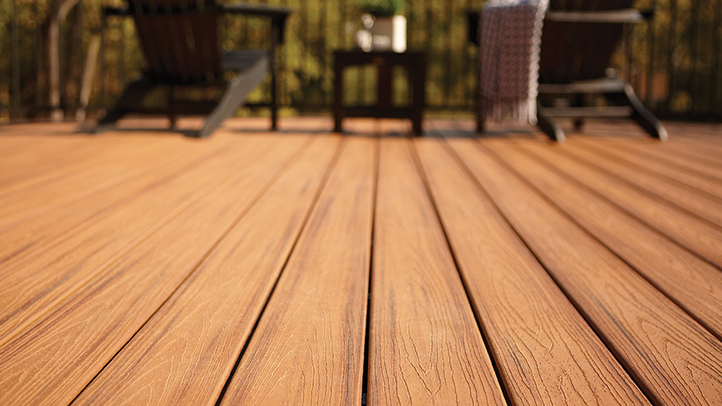
What Is Mineral-Based Composite Decking?
Composite decking has continued to advance, with some manufacturers tweaking the composite mix to include minerals. These boards are known as mineral-based composites, or MBCs, and deliver many of the same benefits as composite decking, plus a few unique twists.
The biggest note is that mineral-based composite decking is incredibly stable even when temperatures shift. Wood decking changes shape dramatically when temperatures swing - that’s what causes warping, cracking, and splintering in any wood structure that’s exposed to the outdoor elements. Composite decking features far less expansion and contraction than wood, holding its shape better and keeping fasteners from working loose. Mineral-based composite decking takes it a step further, showing almost no thermal expansion or contraction. That makes for an especially stable, long-lasting deck surface that needs less regular inspection and maintenance.
Mineral-based composites also provide the best strength-to-weight ratio on the decking market, coming in around 35% lighter than traditional wood-plastic composites.
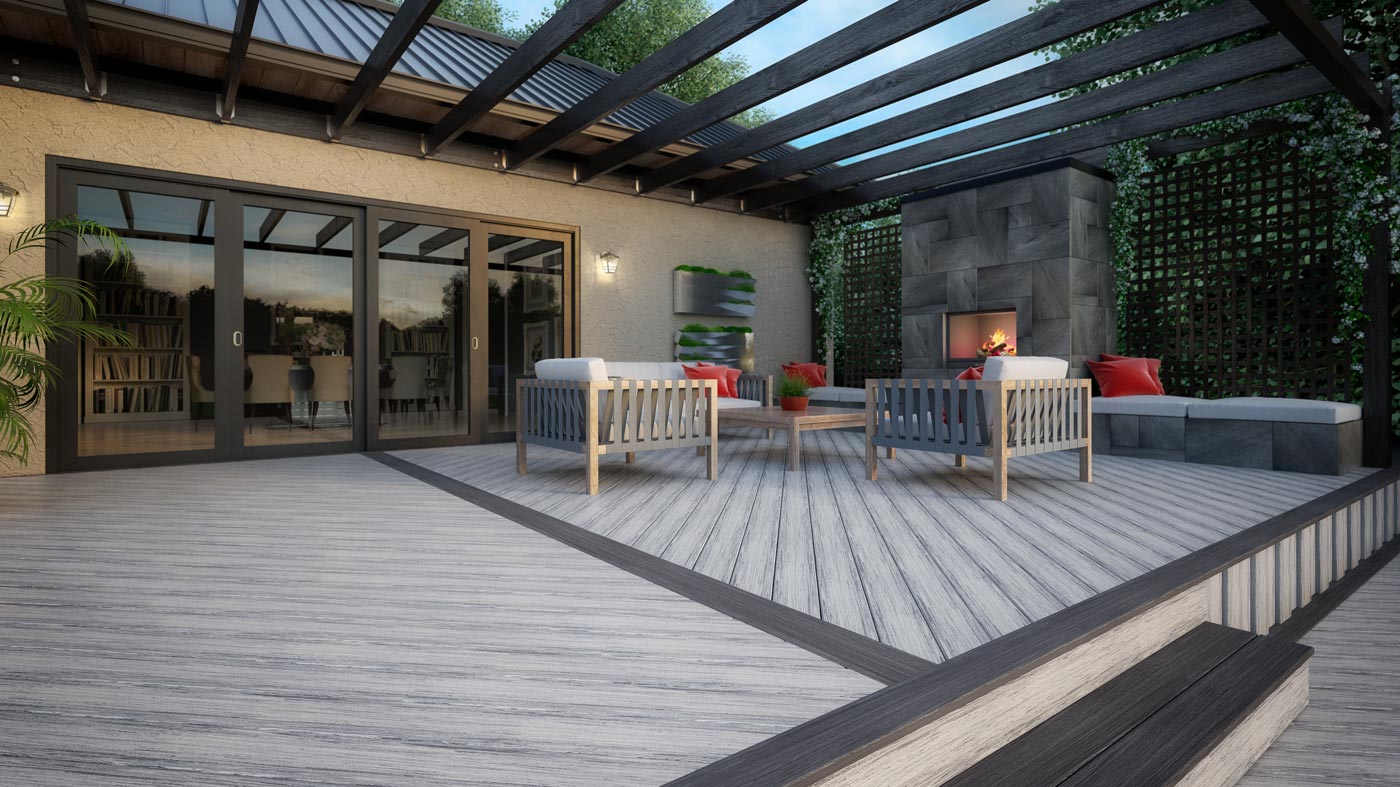
What Is PVC Decking?
Where composite decking is a mix of natural and synthetic materials, PVC decking is 100% synthetic. Like composite decking, PVC is extremely durable and low-maintenance, lasting a long time and holding its looks through all sorts of weather.
Because PVC decking has no organic material, it’s even more water-resistant than composites. That means total resistance to mold, mildew, and insect damage.
PVC decking is also lighter than composite decking, and it cools down a bit faster if your deck is in direct sunlight and tends to retain heat.
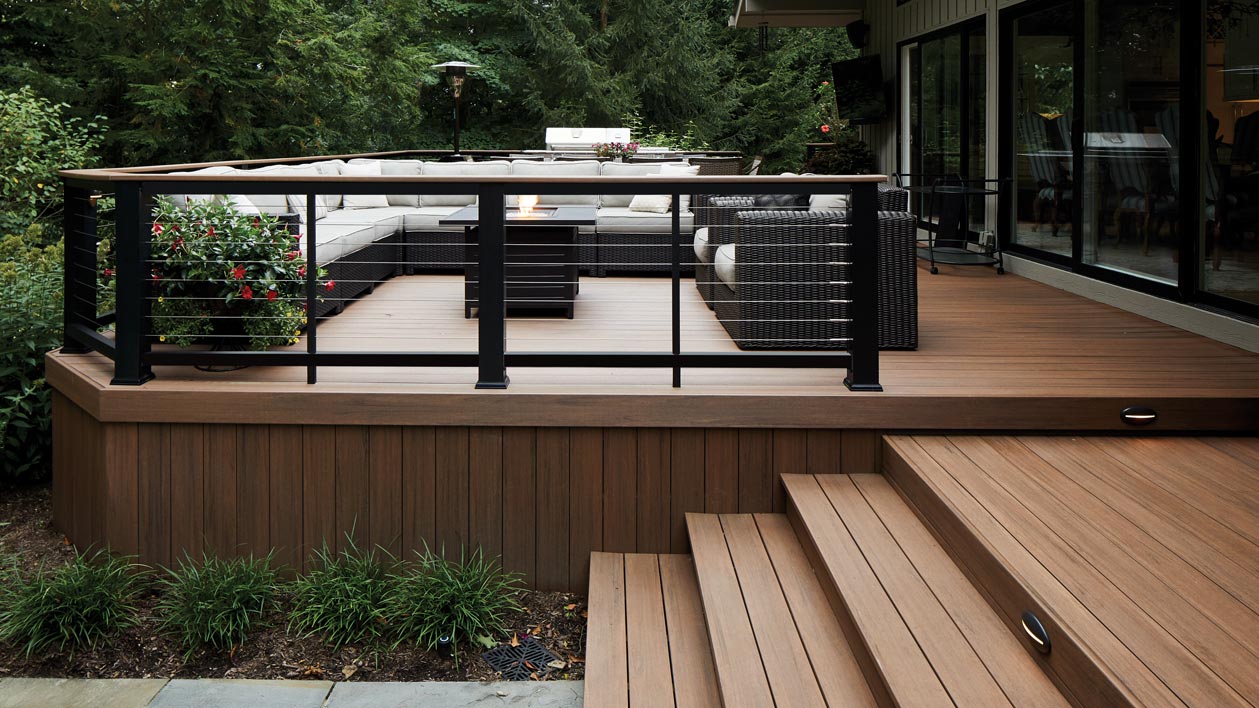
PVC Vs Composite Decking
One thing to note when comparing composite and PVC decking is that the ends of composite decking will usually show a visible capping. This cap protects the board and gives it the distinctive wood look.
You can see the capping below in this TimberTech Composite deck board profile:
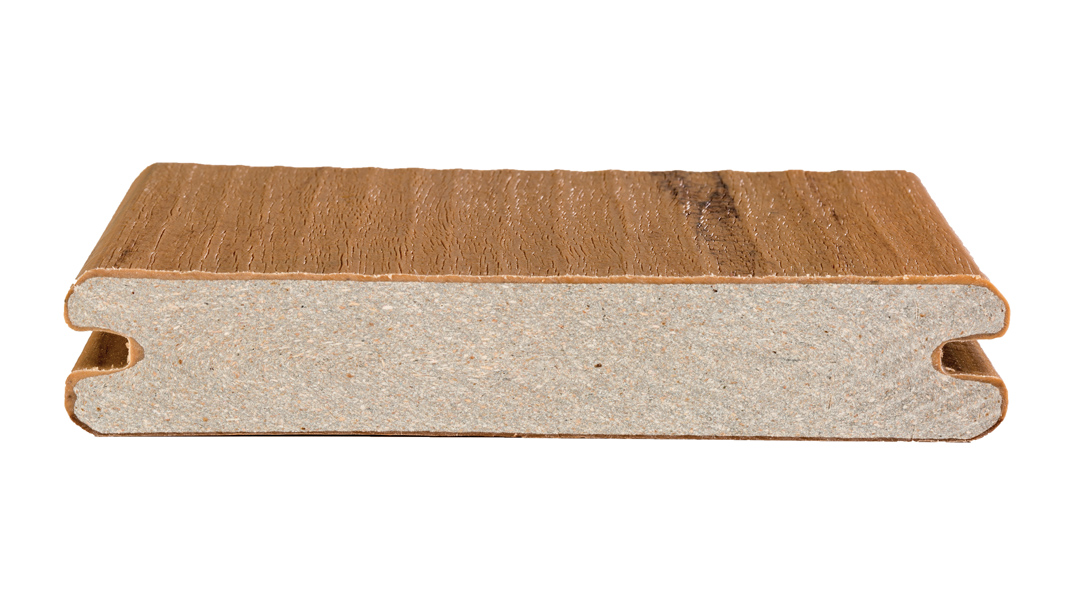
Here’s a similar profile of a TimberTech Advanced PVC deck board:
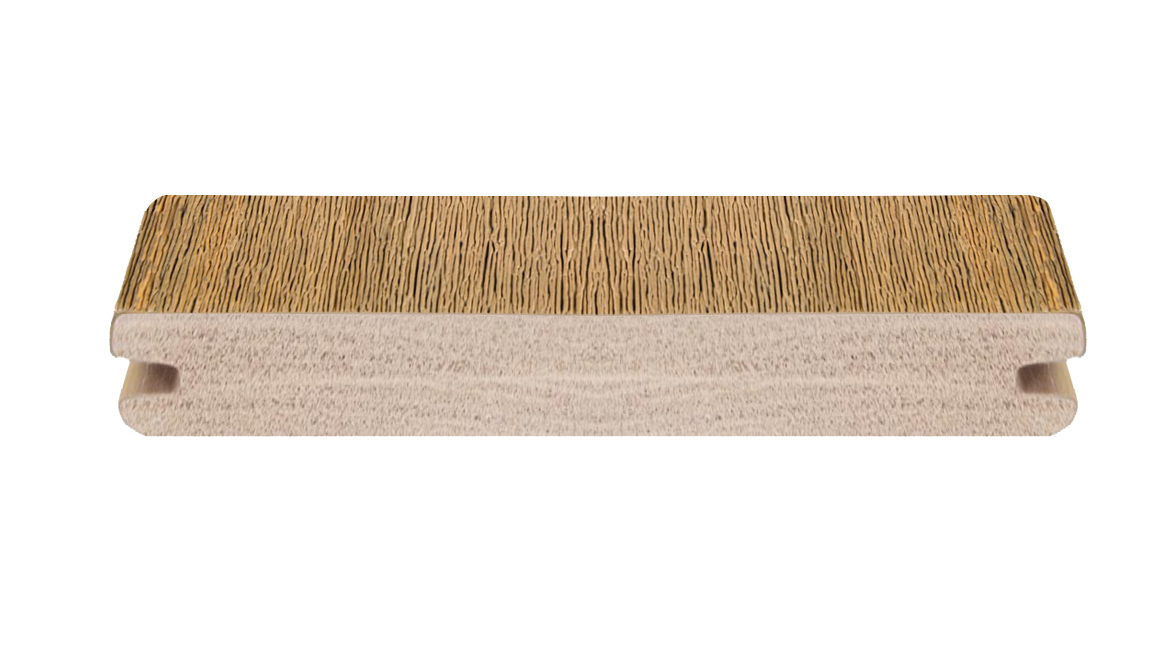
What’s the Best Decking Material For My Outdoor Living Space?
Now that we’ve run through the differences in decking materials, let’s return to the ideal deck you pictured earlier and connect some of its qualities to a specific deck board material.
For the sake of time, this is just a sampling of some of the priorities you might be weighing in your deck vision. For an even more personalized approach, call a deck project planner at 1-888-824-5316 for a free consultation and a timely ballpark project estimate!
Most Water-Resistant Deck Boards: PVC
If your deck is right by the water, you won’t find a more moisture-resistant material than PVC decking. PVC boards don’t absorb water, giving them the best resistance to mold and mildew, which thrive on moisture.
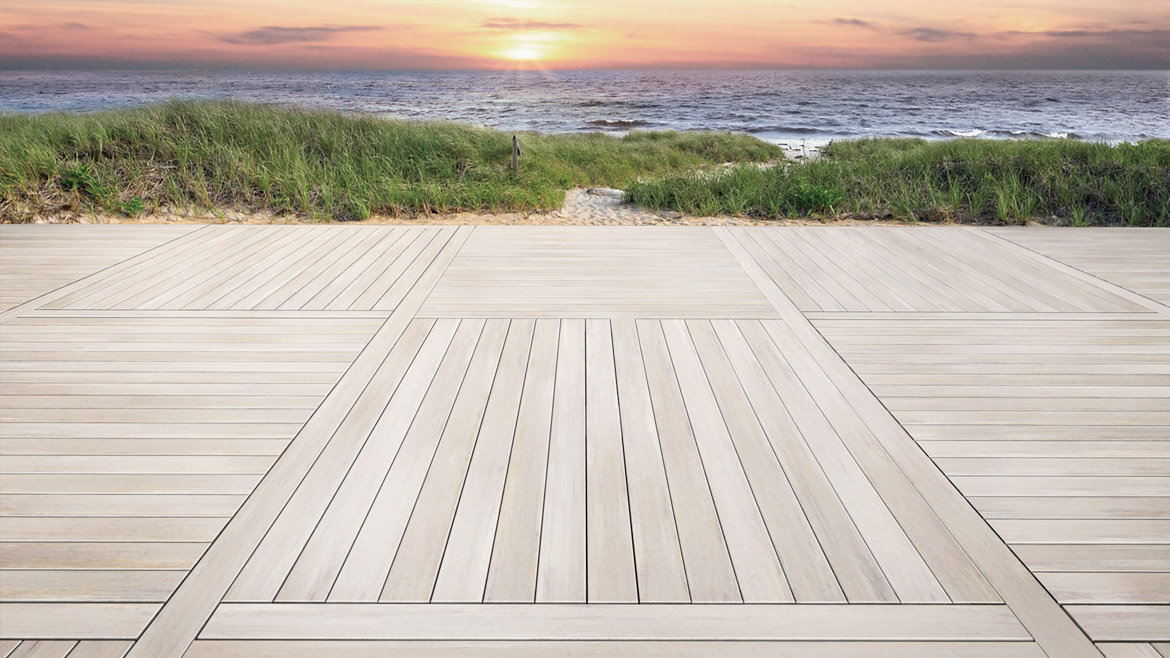
Honorable mention: most premium composite decking is capped with PVC material around the outside, which protects most of your deck board surfaces from moisture. Composite deck boards can work just fine near water, and are certainly an improvement over traditional wood decking in moisture resistance. If your deck is near water and you choose composite decking, we recommend a board that is capped on all four sides, like TimberTech Composite.
Deck Boards With The Most Style And Color Options: Composite
If you’ve got a very specific color or look in mind, traditional composite decking is your best bet to find it. Composite decking has exploded in recent years. We carry six different brands that meet our high standards for premium-quality deck boards. Each of those brands features multiple decking lines, usually differentiated by “good/better/best” quality and price point.
For help navigating each brand’s unique qualities, read more here or call us at 1-888-824-5316.
Between all those brands and lines, there’s an amazing range of colors and wood grain looks to choose from. Whatever your vision, we’re confident we can find a board to deliver on it within our massive selection of composite deck boards. Below are just a few of the wide-ranging looks amid the composite decking selection.
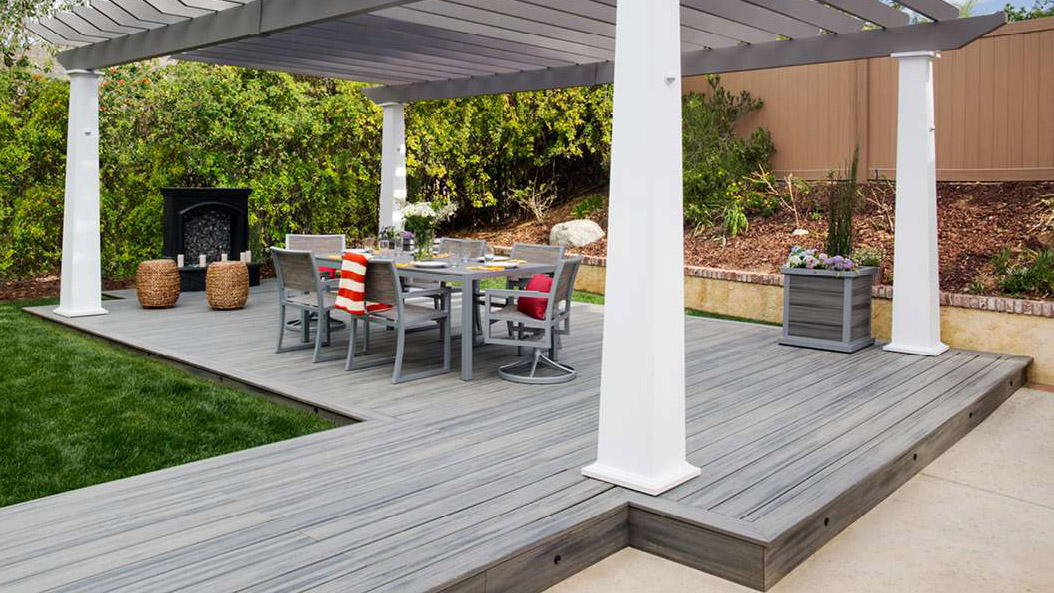
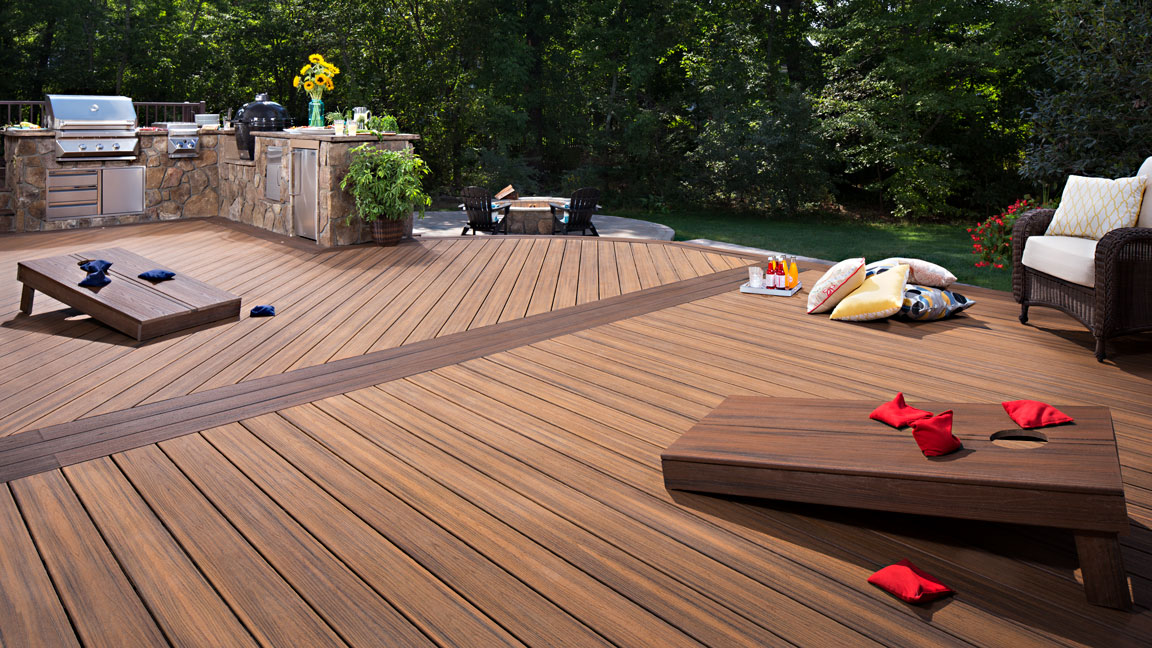
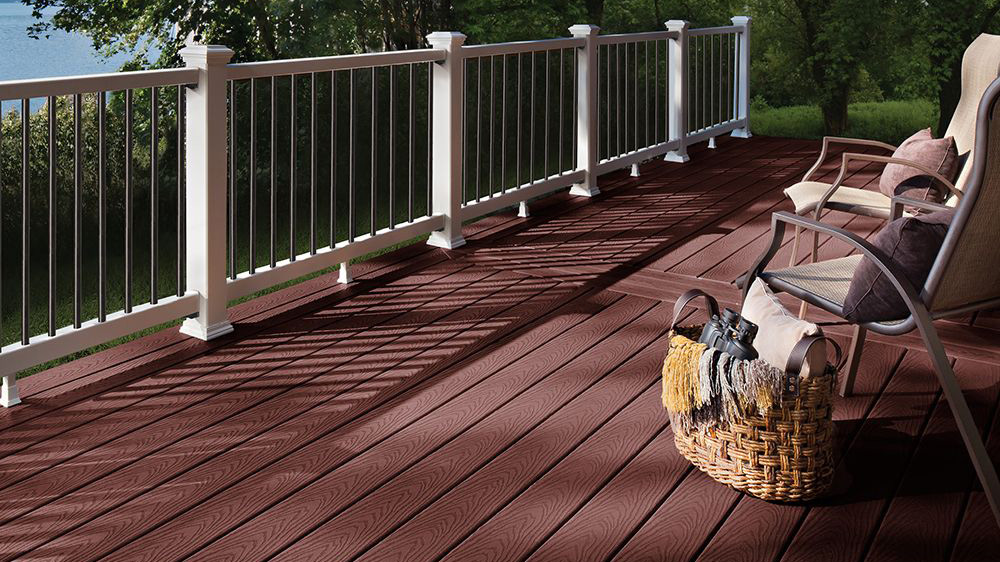
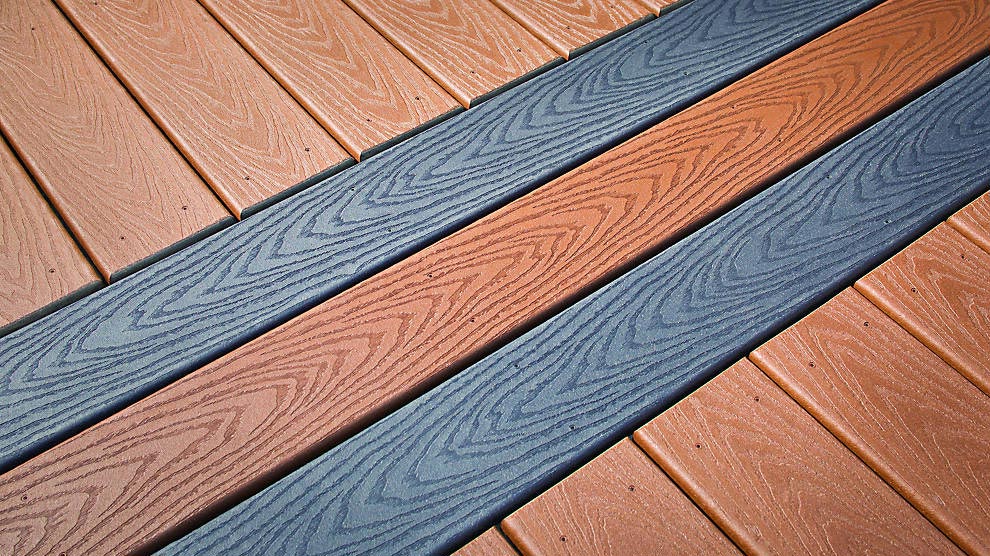
Best-Performing Deck Boards In All Climates: Mineral-Based Composite
If you live in a climate with a wide range of temperatures, mineral-based composite will be your most stable option. Mineral-based composite decking shows almost zero expansion and contraction with changing temperatures, which keeps your boards from warping, moving, or slowly working fasteners loose.
_landscape_web.jpg)
Best Deck Boards For Staying Cool On Hot, Sunny Days: PVC
No matter what decking material you use - wood, composite, or PVC - direct sunlight will cause boards to heat up and feel warm to the touch. For south-facing decks or decks in hot, sunny climates, that can make it difficult to walk with bare feet during the heat of the day.
PVC decking, though, tend to cool down faster than traditional composite. That means your deck may still get hot through the middle of a summer scorcher, but it will cool down more quickly as the sunlight and temperature drop.
Hot deck boards of all materials are mostly driven by three factors: color, sunlight, and the local temperature. So choosing a light-colored deck board, like a cool gray, will go a long way in keeping your deck surface from getting too hot.
Shop PVC DeckingMost Durable Deck Boards: PVC
PVC decking is also the top choice for long-lasting, durable deck boards. Much of this owes to PVC’s water resistance. It’s moisture-absorption that causes most of wood decking’s durability issues: warping, splitting, cracking, mold, mildew, rot, and insect damage.
Composite decking (both traditional wood-plastic composite and mineral-based composite) is also a highly-durable choice that far exceeds wood’s qualities. But PVC is one more step up for the best in durability.
Shop PVC DeckingSafest Deck Boards For Foot Traction: Composite
Composite deck boards tend to have the best surfaces for foot traction - though this can really depend on the specific board you choose. Each line of composite or PVC decking has its own unique wood-grain texture, and some of these provide better traction than others.
In general, composite decking will provide you with the best surface traction. But if you’re in love with the look of a PVC board, we’d suggest calling us at 1-888-824-5316, where we can describe the board’s texture and even set you up with a sample you can see and feel in person.
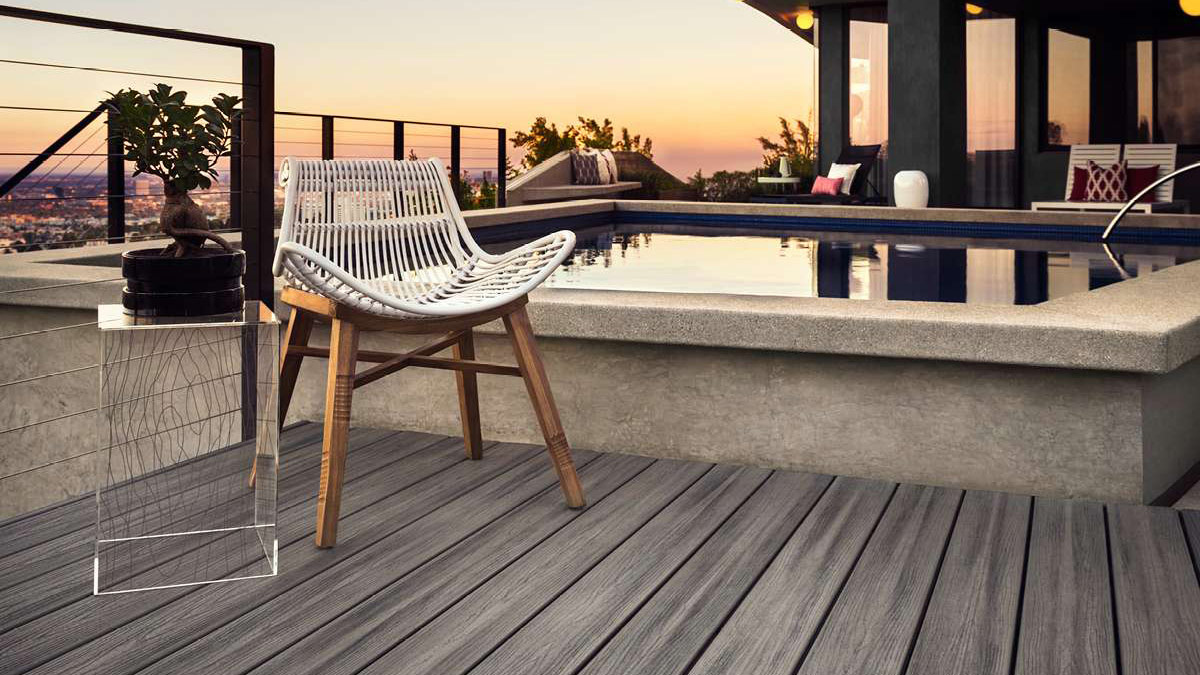
Most Natural-Looking Deck Boards: Composite
Because they contain real wood fibers, composite deck boards tend to offer the best natural-wood looks in the low-maintenance decking market. Composite deck boards feature beautiful, unique wood grain patterns - depending on the look you want, you can find composite boards with a very classic surface-level cathedral graining or with a more textured, deep-grooved surface.
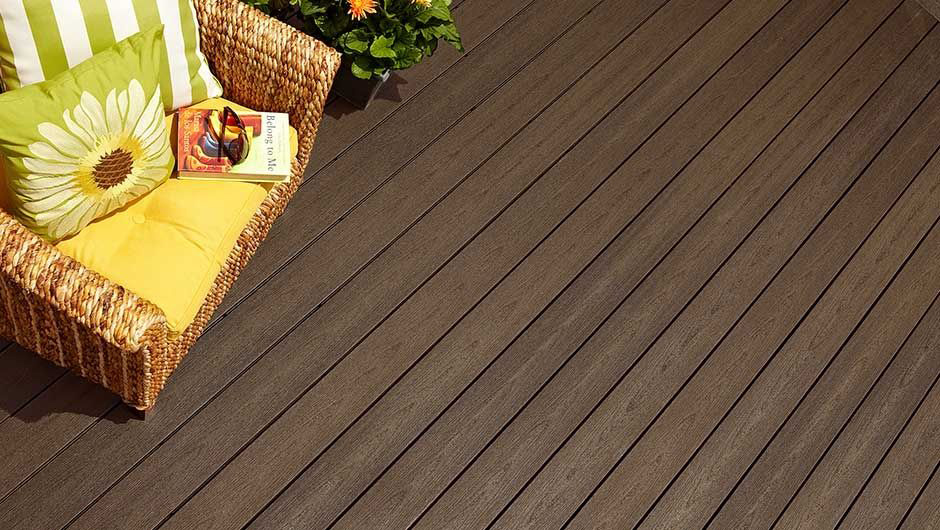
Deck Boards With The Best Strength-To-Weight Ratio: Mineral-Based Composite
If you’re looking to balance premium strength with deck boards that are easier to ship, move, and install, then mineral-based composite decking is your ideal board.. As far as weight goes, PVC decking is the lightest and traditional composite the heaviest. Mineral-based composite falls somewhere between the two, but with the best pound-for-pound strength of the bunch.
